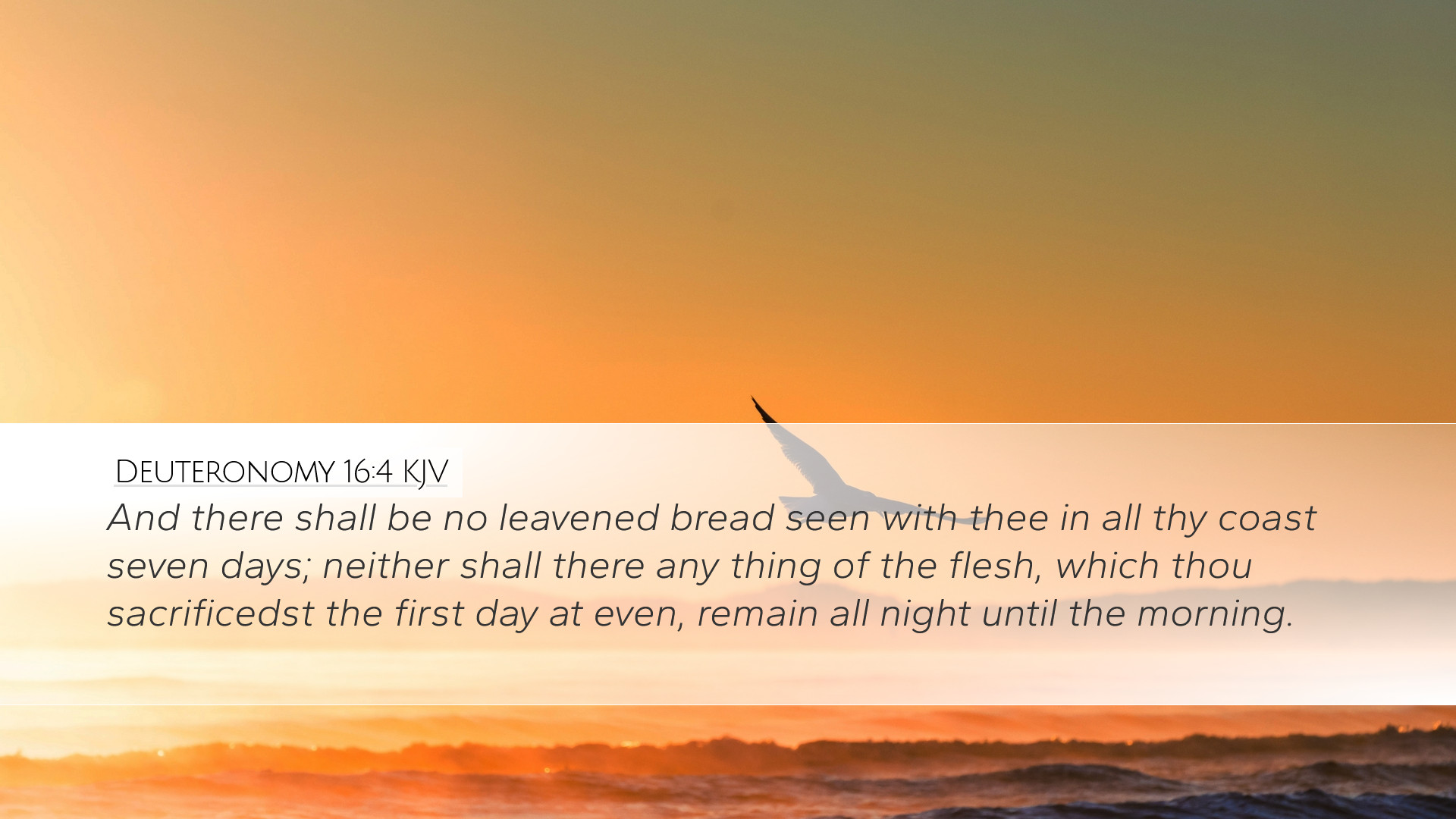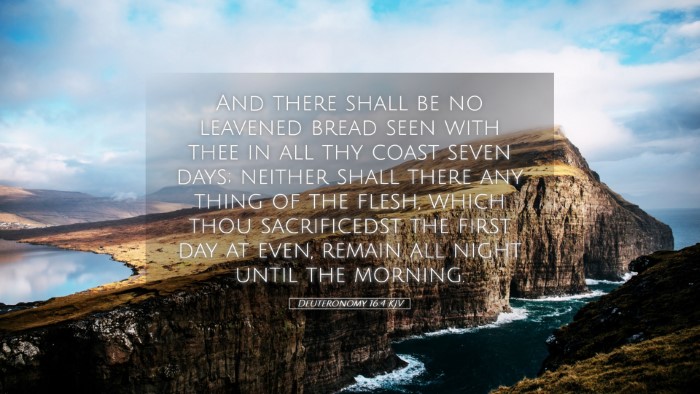Commentary on Deuteronomy 16:4
Bible Verse: "And there shall be no leavened bread seen with thee in all thy coasts seven days; neither shall there any thing of the flesh, which thou sacrificest the first day at even, remain all night until the morning." (Deuteronomy 16:4)
Introduction
The verse from Deuteronomy 16:4 is situated within the context of God's instructions regarding the festivals and sacrifices that the Israelites were to observe. This command specifically pertains to the Feast of Unleavened Bread, which occurred following the Passover. The prohibition against having leavened bread signifies a deeper spiritual meaning and foreshadows Christ's atoning sacrifice.
Matthew Henry's Commentary
Matthew Henry elucidates the rich symbolism embedded in the absence of leaven during this festival. He states that leaven is often emblematic of sin and corruption. The act of removing leaven represents the believer’s need for purification and separation from sin. In a broader theological sense, Henry emphasizes that the instructions reflect God's desire for His people to experience spiritual renewal and holiness.
Spiritual Implications
Henry suggests that the removal of leaven serves as a powerful reminder for Christians today; it encourages introspection regarding one's own life. The commitment to removing ‘leaven’—or sinful habits—must be deliberate and ongoing. This ritual not only commemorates the Exodus but also underscores the continual cleansing necessary in the life of a believer.
Albert Barnes' Insights
Albert Barnes provides a historical and cultural context for this verse, noting how the Israelites were commanded to observe these regulations as a reflection of divine obedience and community identity. He points out that leaven was a common element in their daily lives, making the instruction practically and symbolically significant.
Preservation of Holiness
Barnes emphasizes that the command serves as both a communal and personal obligation to maintain holiness. The absence of leaven for seven days symbolizes a complete and intentional transformation. It illustrates the significant effort required to eradicate sinful influences from one’s life. For the believer, this period should invite serious reflection on holiness and the need for sanctification.
Adam Clarke's Commentary
Adam Clarke offers a detailed exploration of the ritualistic aspects of this command. He discusses the process of sacrifices and the requirement that nothing from the sacrifices be kept until the morning. Clarke notes this was part of a larger framework of worship intended to demonstrate total devotion to God.
Concept of Dedicated Offerings
According to Clarke, the prohibition against allowing meat from the sacrifice to remain overnight symbolizes truthfulness and accountability in worship. The Israelites were to offer their best to God, which included timely consumption and proper disposal of sacrificial remnants. This dedication reflects on the earnestness with which God's people are to approach sacrifice and devotion, which Clarke firmly believes extends to modern practice.
Theological Reflections
Each commentary converges on the vital connection between observance of these laws and the underlying theological truths they reveal. This is a call for absolute purification, both in practice and in heart. Just as the Israelites were to rid their households of leaven, believers are called to remove sin from their lives.
Leaven as a Metaphor
- Sin: Represented by leaven, reminding believers of how even a small amount can permeate their lives.
- Corruption: Leaven signifies moral and spiritual decay that can grow if left unchecked.
- Redemption: The observance of this law foreshadows Christ, whose life was devoid of sin, offering true redemption.
Practical Applications
Pastors, students, and theological scholars can draw several practical applications from Deuteronomy 16:4:
- Self-Examination: Regularly assess one’s life for areas of unconfessed sin or indifference to holiness.
- Community Worship: Foster a community that encourages accountability and mutual encouragement in upholding spiritual integrity.
- Educating on Sacrifice: Help congregations understand the significance of sacrifice in relation to Christ's redemptive work.
Conclusion
Deuteronomy 16:4 encapsulates profound lessons in holiness, community identity, and the serious nature of offerings to God. Through the lens of public domain commentaries, it's evident that the requirement of sacrificial purity continues to resonate with believers, urging them to cultivate lives marked by holiness and dedicated service to God. The removal of leaven is not merely an ancient ritual; it serves as an ongoing spiritual challenge to live a life free from the hindrances of sin.


